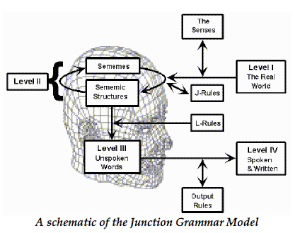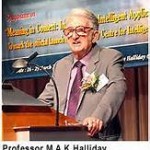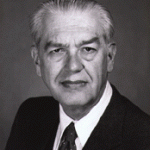Language in CAPS
Purpose
My purpose in writing this book is to share a unique perspective on language which I have found to be invigorating and eminently helpful in understanding the manner in which we, as multi-dimensional beings interact with the world in which we live. Although my message is intended primarily for the scientist and philosopher, I invite inquiring minds of all persuasions and paradigms to read and contemplate what I have to say, for the substance of it is pertinent to everyone.
What This Book Is About
THIS BOOK initially undertook to make available to linguists an extensive update of the `junction grammar’ model of language. However, as the project progressed, it became increasingly apparent that the upgrade model was very much akin to what Benjamin Whorf may well have presented as his FULL model linking MIND, LANGUAGE, and REALITY had his life been extended.
In connection with this discovery came the realization that the author had more or less stumbled into a novel view of the ‘big picture.’ To test the consistency and systematicity of this ‘Whorfian’ perspective, the model was ultimately coupled with a formal system of notation complete with its own primes to elucidate the substance and processes of universal structuring which arise from its axiomatic base.
As the principles revealed by the research merged into a coherent ‘one-liner,’ they echoed loudly the brazen proclamation of another star in the linguistic galaxy:


Linguistics has got to accept its responsibility now, as being the core science. In a sense it has to replace physics as the leading science.
— Michael Halliday
“LANGUAGE in Capital Letters” undertakes to demonstrate why these men were correct in declaring linguistic science to be at the very core of epistemology and to illustrate the essential features of the notation required to make the resulting `LANGUAGE’ system explicit.
http://www.junction-grammar.com

One wonders, indeed, what makes the notion of ‘linguistic relativity’ so fascinating even to the nonspecialist. Perhaps it is the suggestion that all one’s life one has been tricked, all unaware, by the structure of language into a certain way of perceiving reality, with the implication that awareness of this trickery will enable one to see the world with fresh insight.
— John B. Carroll

The brain is wider than the sky,
For, put them side by side,
The one the other will contain
With ease, and you beside.
— Emily Dickenson
Benjamin Whorf
Linguistic Relativity
If the impact of ideas and their potential for transforming society is the gauge of mental greatness, then the greatest mind of the twentieth century may well have belonged to a man you never heard of. His name was Benjamin Lee Whorf. Benjamin was an inspector for Hartford Fire Insurance Company and ‘amateur linguist,’ or so his detractors would have you believe.
In reality, he was an intellectual giant whose insights elucidated the nature and role of language in the cosmic order like no other before him or since. Whorf did not write an opus trumpeting his findings to the world but, rather, a series of expository articles setting forth his views on language, their implications for mankind generally and science specifically.
Whorf’s assessment of how things stood did not gratify the professionals of his day, for what he had to say was brutal in its frankness:

“Natural man,”he wrote, “whether simpleton or scientist, knows no more of the linguis- tic forces that bear upon him than the savage knows of gravitational forces.”
— Whorf,1998, pg. 251
Why the pessimism? It turns out that, at a time when the world at large took comfort in the assumption that observation and perception from person to person were unified by standard bio- logical equipment, Whorf had detected a complicating factor, namely, linguistic relativity:
From this fact proceeds what I have called the “linguistic relativity principle,” which means, in informal terms, that users of markedly different grammars are pointed by their grammars toward different types of observations and different evaluations of externally similar acts of observation, and hence are not equivalent as observers but must arrive at somewhat different views of the world.<Whorf, 1998, pg. 221>
Author’s Preface
We are thus introduced to a new principle of relativity, which holds that all observers are not led by the same physical evidence to the same picture of the universe, unless their linguistic backgrounds are similar, or can in some way be calibrated.
— Whorf, 1998

First it had been temporal relativity (Einstein), and now, given that Whorf was correct, linguistic relativity. According to the first, observations of time are not constant but relative to the space-time frame from whence they are made. According to the latter, observation, comprehension, perception, thinking, and behavior are all relative to the personalized language-thought frame of the observer. The formula involved was straightforward and unequivocal:
(Linguistic Relativity). LANGUAGE ⇐⇒ THOUGHT
— Whorf
For those who understood it, Whorf’s relativity was enough to send chills down the spine! The implications were staggering — that universal essence of reason uncontaminated by anything at all (a notional relic of the ancient Greeks steeped in some 2500 years of tradition) now trembled on the brink of extinction.
For canon-centered religion, it meant that the ‘Holy Word of God,’ speaking from sacred writ, was a source of division and strife rather than unity among believers so long as they were not of ‘one heart and one mind.’ So far as the secular world was concerned, it meant that:
…science’s long and heroic effort to be strictly factual [had] at last brought it into entanglement with the unsuspected facts of the linguistic order. These facts the older classical science had never admitted, confronted, or understood as facts.
— Whorf, 1998
In a word, the supposed objectivity of science was a myth. Whorf’s linguistic relativity threatened establishment science for another reason as well, for what behaviorist psychology had declared off-limits, Whorf had now made the center of attention and investigation — the mind of man in its inner workings.
Could Whorf possibly be right? Students were captivated by the idea and signed up for courses in linguistics while, for the first time ever, ordinary Joe became aware of ‘language.’1 A paradigm shift loomed on the horizon. Tragically, however, at the age of forty-four, well before his work could reach fruition, Benjamin died.
Editorial Reviews
About the Author
Dr. Lytle received his MA and PhD degrees from Brigham Young University and the University of Illinois, respectively, specializing in languages and linguistic theory. Work conducted in the area of `structural derivation in Russian’ (his dissertation topic) led him to develop `junction grammar,’ a model of language which challenged the incumbent paradigm (`transformational grammar’). Owing to the ability of the model to provide plausible representations for many linguistic structures not formerly understood, it quickly became the vehicle for novel approaches to problems in Natural Language Processing, including machine translation and computerized evaluation of written products.
During the 1970’s, junction grammar served as the basis for successful experiments in language pedagogy at the LDS Language Training Mission of Provo, Utah, and in the Nebo and Cache Valley school districts of northern Utah. A third application of the model was made abroad by the International Linguistics Foundation of Sau Paulo, Brazil, a commercial enterprise specializing in English instruction for foreigners. In subsequent work during the 1980s, Dr. Lytle utilized junction grammar as a frame of reference for WordMAP, the first computer software writing-aids ensemble designed specifically for linguistic testing and sublanguage analysis.
In conjunction with this endeavor, Dr. Lytle designed and coded JGPL (a linguistic pattern matching language) and LEX, a lexical decomposition language. Subsequently, Dr. Lytle joined forces with The Educational Testing Service (ETS) of Princeton, N.J. to successfully simulate the holistic scoring of English papers using his WordMAP software. Dr. Lytle was founder and director of BYU’s Translation Sciences Institute during his tenure there (1968-1980) and subsequently co-founder of Automated Language Processing Systems (ALPS) of Provo, Utah.
Dr. Lytle is currently the principal owner of Linguistic Technologies, Inc., a Nevada corporation specializing in the refinement of linguistic theory and pioneering novel approaches to Natural Language Processing deriving from theoretical innovation.